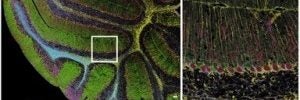Experimental Pathology
About
 Research in Experimental Pathology at UVA involves researchers across the institution who study the molecular and cellular basis of human disease. This work is facilitated by close interactions with clinical colleagues across the Health System who provide perspectives on challenges in patient care.This rigorous training program takes advantage of a unique environment created by a faculty composed of basic scientists, research and diagnostic pathologists, and physician colleagues in other clinical specialties.
Research in Experimental Pathology at UVA involves researchers across the institution who study the molecular and cellular basis of human disease. This work is facilitated by close interactions with clinical colleagues across the Health System who provide perspectives on challenges in patient care.This rigorous training program takes advantage of a unique environment created by a faculty composed of basic scientists, research and diagnostic pathologists, and physician colleagues in other clinical specialties.
Traditional laboratory-based research is complemented by first hand exposure to clinical approaches used in the diagnosis and treatment of human disease. Coursework is designed to complement laboratory research and highlights the interface between basic science and the challenges faced in clinical medicine. In addition, opportunities exist to observe patient care directly through clinical rotations that allow students to experience the complete arc from diagnosis through therapeutic decisions to surgical, radiological or medical interventions.
The curriculum is enriched by a disease-focused participatory journal club and a seminar series that explores the molecular basis of human disease. Students have ongoing access to the expertise of their clinical colleagues as well as laboratory and tissue specimens to facilitate their research projects.
Faculty
Ambati, Jayakrishna
Understanding the Molecular Basis of Macular Degeneration in Order to Hasten the Eradication of Blindness
Anderson, Kristin
Engineering cancer-killing T cells to overcome obstacles in solid tumors
Arandjelovic, Sanja
Innate immunity, Cell clearance, Inflammatory and autoimmune disease
Barker, Thomas H
Matrix Biology and Engineering
Bauer, Todd
Cancer metastasis, chemotherapy resistance, genetic and epigenetic regulation
Bloom, George S.
Pathogenic mechanisms in Alzheimer's Disease and other neurodegenerative disorders
Bullock, Timothy N.
Pathways to enhance T cell function in tumors.
Casanova, James E.
Role of Arf family GTPases in vesicular transport and cytoskeleton assembly.
Cell Biology of bacterial pathogenesis.
The innate immune response to bacterial infection.Cheng, Lily S
Surgery
Cook, Danielle R.
Immuno-Oncology, T cell therapy, TCR Discovery, Next generation cell therapy
Cross, Janet V.
Contribution of the Inflammatory Microenvironment to Tumor Initiation, Progression and Metastasis; Molecular Mechanisms of Cancer Chemoprevention
Erickson, Loren D.
Immune mechanisms of pathogenic antibody production in allergy and autoimmunity
Fallahi-Sichani, Mohammad
Cancer systems biology, Single-cell quantitative biology, Computational modeling
Felder, Robin A.
Clinical Chemistry and Toxicology. Medical Automation Research. Neurotransmitters, cell surface receptors and intracellular second messengers.
Ferris, Heather
Brain metabolism, cognitive decline, insulin signaling and Alzheimer's disease
Gioeli, Daniel
Signal transduction in cancer cells
Goldfarb, Adam N.
Hematopathology and Understanding the Molecular Basis of Hematopoiesis and Leukemogenesis
Griffin, Donald Richieri
Biomedical Engineering
Guo, Lian-Wang
Vascular wall remodeling, intimal hyperplasia, stenosis, aneurysm, retinal degeneration.
Kapur, Jaideep
Seizures, neuronal excitability and plasticity
Kibbe, Melina
Developing novel therapies for patients with vascular disease.
Kuan, Chia-Yi
Neuroscience
Landen, Charles
Mechanisms of Chemotherapy Resistance in Ovarian and Other Gynecologic Malignancies
Lazzara, Matthew
Cellular Engineering
Lee, Kevin S.
Cellular mechanisms of neuronal vulnerability associated with stroke
Li, Hui
Gene regulation in cancer, RNA processing; Epigenetic modification; Stem cell and development
Li, Xin
Plastic Surgery
Liu, Xiaorong
Developing novel neuroprotection strategies to preserve vision in glaucoma
Lu, Xiaowei
Wnt/PCP signaling in inner ear development Mouse models for human deafness Wnt/PCP signaling in neural tube closure
Luckey, Chance John
Immune Memory
Lynch, Wendy J.
Behavioral Pharmacology, Sex Differences, Animal Models of Addiction
Ma, Jianjie
Physiology & Biophysics
Mahadevan, Mani S.
Molecular Mechanisms of Myotonic Muscular Dystrophy
Mauldin, Ileana Soto
Pathology
Miller, Clint L.
Genetic variation, Complex diseases, Coronary artery disease, Genomics, Epigenomics, Regulatory mechanisms, Vascular biology, Pharmacology and Physiology
Mohi, Golam
Cell signaling, stem cell biology, molecular and epigenetic mechanisms of blood and breast cancers
Naegle, Kristen
Regulation and function of tyrosine phosphorylation in complex networks
Owens, Gary K.
Identification of Factors and Mechanisms that Regulate the Stability of Late Stage Atherosclerotic Lesions and the Probability of Thromboembolic Events Including a Heart Attack or Stroke
Papin, Jason
Systems biology, infectious disease, cancer, toxicology, metabolic engineering
Petri, William A
Immune mechanisms of defense against COVID-19 and enteric (diarrheal) infections
Pompano, Rebecca
Bioanalytical tools for inflammatory disease
Sontheimer, Harald
Role of Glia in Neurological Illnesses and Cancer
Sperling, Anne I.
Immune Responses in asthma, pulmonary fibrosis, and lung injury.
Tao, Jianguo
Pathology
Trinh, Bon Q
Understanding Protein and RNA regulations of gene expression via chromatin structure in myeloid cell development and diseases
Tsihlis, Nick Dimitrios
Vascular Biology, Nanotechnology, Biomaterials, Drug Delivery
Vande Pol, Scott B.
How Viruses, Particularly Papillomaviruses, Can Cause Cancer
Witt, Russell Gardner
Unraveling the Role of Obesity, Diet, and Lifestyle Factors in Melanoma Progression and Treatment Efficacy
Zimring, James C
Alloimmunity in Transfusion and Transplantation , Oxidant Stress Biology in Health and Disease
